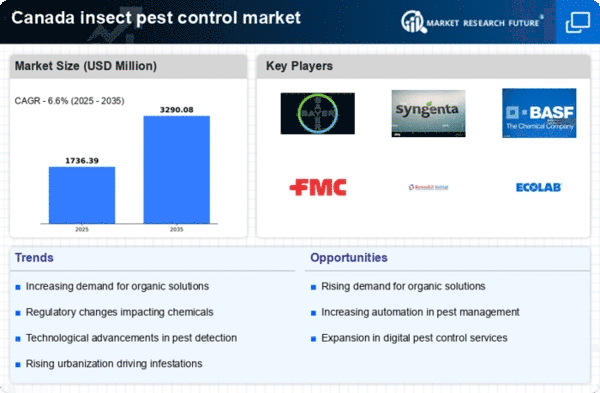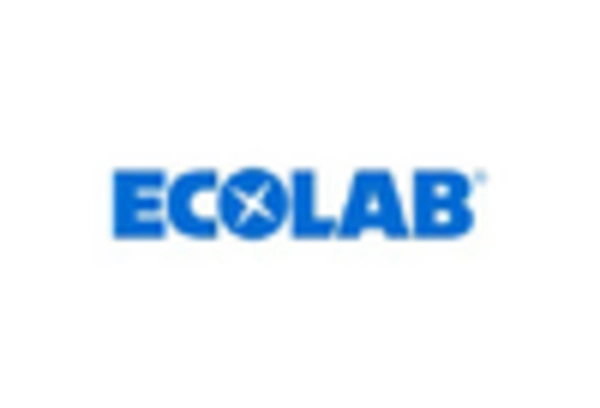The insect pest-control market in Canada is characterized by a competitive landscape that is increasingly shaped by innovation, sustainability, and strategic partnerships. Key players such as Bayer AG (DE), Syngenta AG (CH), and Rentokil Initial plc (GB) are actively pursuing strategies that emphasize technological advancements and eco-friendly solutions. Bayer AG (DE) has positioned itself as a leader in integrated pest management, focusing on developing biopesticides and digital tools that enhance crop protection. Meanwhile, Syngenta AG (CH) is leveraging its research capabilities to introduce novel pest-control products that align with sustainable agricultural practices, thereby appealing to environmentally conscious consumers. Rentokil Initial plc (GB) is also enhancing its service offerings through digital transformation, utilizing data analytics to optimize pest management solutions for both residential and commercial clients. Collectively, these strategies contribute to a dynamic competitive environment where innovation and sustainability are paramount. In terms of business tactics, companies are increasingly localizing manufacturing and optimizing supply chains to enhance operational efficiency. The market structure appears moderately fragmented, with several players vying for market share while also collaborating on sustainability initiatives. This collective influence of key players fosters a competitive atmosphere that encourages continuous improvement and adaptation to market demands. In September 2025, Bayer AG (DE) announced a partnership with a Canadian agricultural technology firm to develop precision pest-control solutions that utilize AI and machine learning. This strategic move is significant as it not only enhances Bayer's product offerings but also positions the company at the forefront of technological innovation in pest management. The collaboration is expected to yield solutions that improve pest detection and treatment efficacy, thereby increasing crop yields and reducing environmental impact. In August 2025, Syngenta AG (CH) launched a new line of biopesticides specifically designed for the Canadian market, targeting key pests that affect local crops. This introduction reflects Syngenta's commitment to sustainability and its strategy to cater to the growing demand for environmentally friendly pest-control options. The biopesticides are anticipated to gain traction among farmers seeking effective yet sustainable solutions, thereby strengthening Syngenta's market position. In October 2025, Rentokil Initial plc (GB) expanded its digital pest management platform, integrating advanced analytics to provide real-time monitoring and reporting for its clients. This enhancement is crucial as it allows Rentokil to offer more tailored solutions, improving customer satisfaction and operational efficiency. The move underscores the importance of digitalization in the pest-control sector, as companies strive to meet the evolving needs of their customers. As of November 2025, current competitive trends indicate a strong focus on digitalization, sustainability, and the integration of AI technologies within the insect pest-control market. Strategic alliances are increasingly shaping the landscape, enabling companies to pool resources and expertise to drive innovation. Looking ahead, competitive differentiation is likely to evolve from traditional price-based competition to a focus on technological advancements, sustainable practices, and reliable supply chains. This shift suggests that companies that prioritize innovation and adaptability will be better positioned to thrive in an increasingly complex market. The termite control market in Canada is gaining importance due to the rising risk of structural damage in residential and commercial properties. Termites pose a significant threat to wooden infrastructure, prompting increased adoption of preventive inspections and long-term control solutions. Growing awareness about early detection and the economic impact of termite infestations is supporting market growth. The industry is evolving with advanced treatment methods such as soil treatment, baiting systems, and barrier protection solutions. As construction activities expand across urban and suburban regions, termite control services in Canada continue to play a crucial role in property protection and maintenance.

















